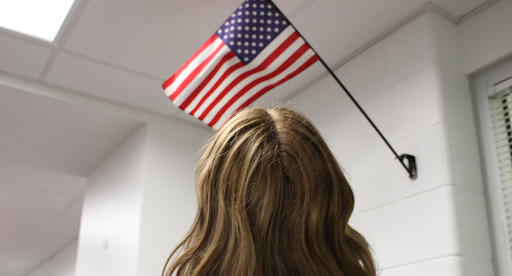Pledge silence today, have respect every day
Silence is golden. In Virginia schools, it is also required.
The daily moment of silence is, in fact, mandatory. A court decision from 2001 upheld the constitutionality of the 1976 law requiring the observance of a minute of silence in Virginia schools every day.
While Virginia public school districts cannot require prayer or other religious observances during the moment of silence, the law states that “during such one-minute period of silence, the teacher responsible for each classroom shall take care that all pupils remain seated and silent and make no distracting display” (Va. Code Ann. § 22.1-203) to allow each student the opportunity to participate in whichever way they desire.
“What you do with the moment of silence is your choice,” said government teacher Erin Wigginton.
According to Virginia Department of Education guidelines adopted in 2001, Virginia school boards are also required to set aside time for the recitation of the Pledge of Allegiance. While public schools must determine a time during the day during which students must recite the Pledge, the guidelines also state that a student cannot be compelled to do so if it conflicts with his or her beliefs, provided he or she is not being disruptive.
“I think if it’s not being done, an administrative lead on that would make it clear that it should be done,” said Wigginton.
The Pledge of Allegiance and moment of silence requirements set out by the Virginia legislature are clear when it comes to the responsibilities of school boards. However, these same laws give students a bit of flexibility.
“I have expectations [when it comes to the Pledge and the moment of silence], and I convey those expectations to my students,” said Wigginton, “When students know what is expected of them, they will perform.”
While students can make an individual decision about their own recitation of the Pledge and observance of the moment of silence, respect and situational awareness remain crucial aspects of these school day requirements.
“I’m not big on intimidation,” said Wigginton, “but there is a difference between appropriate and inappropriate behavior, and I see it as my responsibility to keep the classroom a positive learning environment.”
So what do these daily observances mean at WS? Does it matter that Spartans simply go through the motions, or should they reflect on the significance of the Pledge and the moment of silence?
“I have seen people constantly talking through [the Pledge and the moment of silence],” said senior Cole Rosenberger, “I think it’s extremely disrespectful.”
Respect is incredibly important. As explained in the laws themselves, both students and teachers, though not forced to recite the Pledge or pray during the moment of silence, are required to respect the rights of their peers to do so.
“Whether you have a faith or not, the moment of silence is a time to reflect and relax,” said senior Michelle Yeboah.
Though the observances may lack courteous compliance at WS, recognizing their importance is quite simple for most students. American students have grown up with these observances and can recognize why they are carried out.
“In general, America is a melting pot,” said Yeboah, “What brings us together is our national pride.”
In addition to respect being a necessity in observing the Pledge and moment of silence school-wide, pride is evidently a binding force at WS.
“The pledge is really symbolic and patriotic,” said Rosenberger, “I feel like it’s really important in this day and age to have a constant sense of patriotism.”





